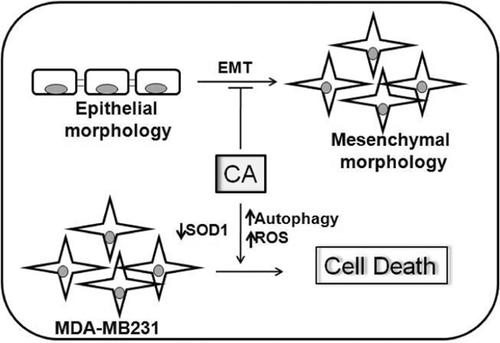当前位置:
X-MOL 学术
›
Cell Biol. Int.
›
论文详情
Our official English website, www.x-mol.net, welcomes your
feedback! (Note: you will need to create a separate account there.)
Chebulinic acid inhibits MDA-MB-231 breast cancer metastasis and promotes cell death through down regulation of SOD1 and induction of autophagy.
Cell Biology International ( IF 3.3 ) Pub Date : 2020-09-09 , DOI: 10.1002/cbin.11463 Akshay Sharma 1 , Tripti Mishra 2 , Gatha Thacker 1 , Mukul Mishra 1 , Tadigoppula Narender 2 , Arun Kumar Trivedi 1, 3
Cell Biology International ( IF 3.3 ) Pub Date : 2020-09-09 , DOI: 10.1002/cbin.11463 Akshay Sharma 1 , Tripti Mishra 2 , Gatha Thacker 1 , Mukul Mishra 1 , Tadigoppula Narender 2 , Arun Kumar Trivedi 1, 3
Affiliation

|
Triple‐negative breast cancers (TNBC) are highly aggressive and drug resistant accounting for majority of cases with poor outcome. Purified natural compounds display substantial anticancer activity with reduced cytotoxicity providing a new avenue to combat TNBC. Chebulinic acid (CA), a polyphenol derived from the fruits of various medicinal plants has potent anticancer activity. Here, we demonstrate that CA shows significant cytotoxicity against triple negative MDA‐MB‐231 cells. CA exhibited cytotoxicity to MDA‐MB‐231 cells in 3‐(4,5‐dimethylthiazol‐2‐yl)‐2,5‐diphenyltetrazolium bromide assay. Further, CA mitigated MDA‐MB‐231 cells viability and proliferation as shown by reduced live cell count, crystal violet staining, colony formation assay, soft agar assay and cell cycle analysis. Wound healing assay and trans‐well migration assay demonstrated that CA significantly inhibited migration of MDA‐MB‐231 cells. Also reduced MMP9 expression was observed in CA‐treated cells by gelatin zymography. CA negatively regulated mesenchymal characteristics of MDA‐MB‐231 cells demonstrated by F‐actin staining and reduced expression of N‐cadherin by confocal microscopy and western blot analysis. Annexin V/propidium iodide (PI) and active caspase‐3 staining showed that CA was able to induce apoptosis in MDA‐MB‐231 cells but did not activate caspase‐3. Two‐dimensional gel electrophoresis based proteomic analysis demonstrated that CA regulated proteins belonging to the oxidative stress pathway, apoptotic pathway and proteins with antiproliferative activity. Western blot analysis analysis revealed that CA negatively regulated superoxide dismutase 1 (SOD1) and enhanced oxidative stress in MDA‐MB‐231 cells. SOD1 in‐gel activity assay also showed reduced SOD1 activity upon CA treatment. Overexpression studies with GFP‐LC3 and tandem tagged RFP‐GFP‐LC‐3 also demonstrated enhanced autophagy upon CA treatment.
中文翻译:

叶酸可抑制MDA-MB-231乳腺癌的转移,并通过下调SOD1和诱导自噬促进细胞死亡。
三阴性乳腺癌(TNBC)具有高度侵袭性和耐药性,是大多数预后不良的病例。纯化的天然化合物显示出显着的抗癌活性,并降低了细胞毒性,为抗击TNBC提供了新途径。Chebulinic acid(CA),一种衍生自各种药用植物果实的多酚,具有有效的抗癌活性。在这里,我们证明了CA对三阴性MDA-MB-231细胞具有明显的细胞毒性。在3-(4,5-二甲基噻唑-2-基)-2-溴5-二苯基四唑鎓测定中,CA对MDA-MB-231细胞表现出细胞毒性。此外,如减少的活细胞计数,结晶紫染色,集落形成测定,软琼脂测定和细胞周期分析所示,CA减轻了MDA-MB-231细胞的活力和增殖。伤口愈合分析和跨孔迁移分析表明,CA显着抑制了MDA-MB-231细胞的迁移。通过明胶酶谱分析,在CA处理的细胞中还观察到了MMP9表达降低。CA通过F-肌动蛋白染色对MDA-MB-231细胞的间充质特征进行负调节,并通过共聚焦显微镜和Western blot分析证实N-钙粘着蛋白的表达降低。Annexin V /碘化丙啶(PI)和活性的caspase-3染色表明,CA能够诱导MDA-MB-231细胞凋亡,但不激活caspase-3。基于二维凝胶电泳的蛋白质组学分析表明,CA调节了氧化应激途径,细胞凋亡途径和具有抗增殖活性的蛋白质。蛋白质印迹分析分析显示,CA对MDA-MB-231细胞的超氧化物歧化酶1(SOD1)具有负调节作用,并增强了氧化应激。在CA处理后,SOD1凝胶活性测定也显示SOD1活性降低。使用GFP-LC3和串联标签的RFP-GFP-LC-3进行的过表达研究还显示,CA处理后自噬增强。
更新日期:2020-11-12
中文翻译:

叶酸可抑制MDA-MB-231乳腺癌的转移,并通过下调SOD1和诱导自噬促进细胞死亡。
三阴性乳腺癌(TNBC)具有高度侵袭性和耐药性,是大多数预后不良的病例。纯化的天然化合物显示出显着的抗癌活性,并降低了细胞毒性,为抗击TNBC提供了新途径。Chebulinic acid(CA),一种衍生自各种药用植物果实的多酚,具有有效的抗癌活性。在这里,我们证明了CA对三阴性MDA-MB-231细胞具有明显的细胞毒性。在3-(4,5-二甲基噻唑-2-基)-2-溴5-二苯基四唑鎓测定中,CA对MDA-MB-231细胞表现出细胞毒性。此外,如减少的活细胞计数,结晶紫染色,集落形成测定,软琼脂测定和细胞周期分析所示,CA减轻了MDA-MB-231细胞的活力和增殖。伤口愈合分析和跨孔迁移分析表明,CA显着抑制了MDA-MB-231细胞的迁移。通过明胶酶谱分析,在CA处理的细胞中还观察到了MMP9表达降低。CA通过F-肌动蛋白染色对MDA-MB-231细胞的间充质特征进行负调节,并通过共聚焦显微镜和Western blot分析证实N-钙粘着蛋白的表达降低。Annexin V /碘化丙啶(PI)和活性的caspase-3染色表明,CA能够诱导MDA-MB-231细胞凋亡,但不激活caspase-3。基于二维凝胶电泳的蛋白质组学分析表明,CA调节了氧化应激途径,细胞凋亡途径和具有抗增殖活性的蛋白质。蛋白质印迹分析分析显示,CA对MDA-MB-231细胞的超氧化物歧化酶1(SOD1)具有负调节作用,并增强了氧化应激。在CA处理后,SOD1凝胶活性测定也显示SOD1活性降低。使用GFP-LC3和串联标签的RFP-GFP-LC-3进行的过表达研究还显示,CA处理后自噬增强。











































 京公网安备 11010802027423号
京公网安备 11010802027423号